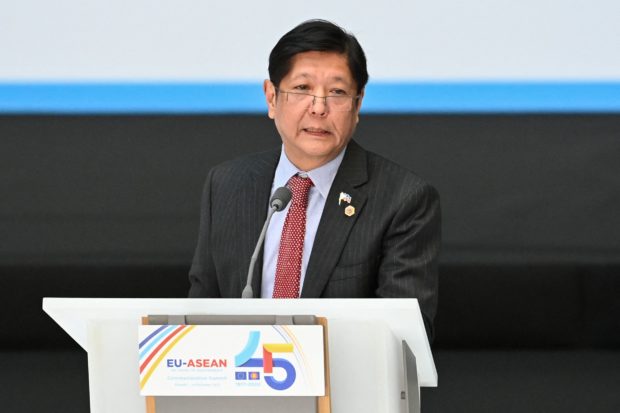
President Ferdinand “Bongbong” Marcos | FILE PHOTO: John THYS / AFP
MANILA, Philippines – It was no less than President Ferdinand Marcos Jr. who proposed the establishment of a direct communications channel between the foreign ministries of the Philippines and China to handle disputes in the West Philippine Sea, Malacañang said on Thursday.
The Presidential Communications Office (PCO) said Marcos sought the joint agreement to smooth out talks on issues in the contested waters.
“President Marcos himself proposed the establishment of a direct communication mechanism between Manila and Beijing to avoid heightened tension in the West Philippine Sea,” the PCO said in a statement.
Marcos, in a media interview cited by the PCO, said he put forward the proposal of the communication lines reaching both him and his Chinese counterpart Xi Jinping.
“Ang aking proposal ay iakyat, pataasin natin ang bilateral, ang mga member ng mga bilateral [group]. Sabi ko, ang pinakamaganda, sana ‘yong Chinese members of the bilateral group have direct access to the President (Xi),” he explained.
(My proposal is to elevate it and involve members of the bilateral groups. I said it would be best if the Chinese members of the bilateral group have direct access to President Xi.)
Marcos said he will likewise ensure that those in his bilateral team would have direct access to him on matters discussed through the channel.
“Nothing will be lost in translation. Hindi magkakaproblema sa misinformation na maaring mangyari kapag napakatagal bago nakapag-usap kami [There won’t be a problem with misinformation that may be the case if it takes a long time before we get to speak],” he added.
Marcos and Xi earlier made a joint statement to affirm the establishment of the direct communication mechanism, which would be opened to the Maritime and Ocean Affairs Office of the Department of Foreign Affairs and the Department of Boundary and Ocean Affairs of the Ministry of Foreign Affairs of China.
READ: China, Philippines agree on direct communication channel on disputed waters
Talking it out
The PCO said Marcos believes incidents that kindled conflicts between Chinese authorities and Filipino fisherfolk, as well as members of the Philippine Coast Guard, are “a result of a lack of communication.”
But when asked if the deal will result in fewer cases of harassment and intimidation to Filipino fishers in disputed fishing grounds like the Scarborough Shoal, Marcos said this is a vital part of the agreement that China will consider.
“When we get back, the Foreign Secretary [Enrique Manalo] and his counterparts here in China will finalize the organization of that and the situation without fishermen will be number one on the agenda,” he added.
The Philippines previously sounded the alarm over reported Chinese construction activities and “swarming” of Beijing’s vessels in the contested waters.
Aside from forging a direct communication channel on issues concerning the maritime dispute, China and the Philippines have also expressed interest in resuming joint oil and gas talks during Marcos’ state visit.
READ: Xi to Marcos: China ready to resume oil, gas talks
In 2018, the two countries pledged to jointly explore oil and gas assets in the West Philippine Sea.
But the talks were set aside and in June, then Foreign Secretary Teodoro Locsin Jr. said the discussions had been terminated due to constitutional limits and sovereignty issues.
He noted that Marcos’ predecessor, Rodrigo Duterte, made the call to discard the talks.
READ: PH ends talks for joint oil, gas search with China in WPS